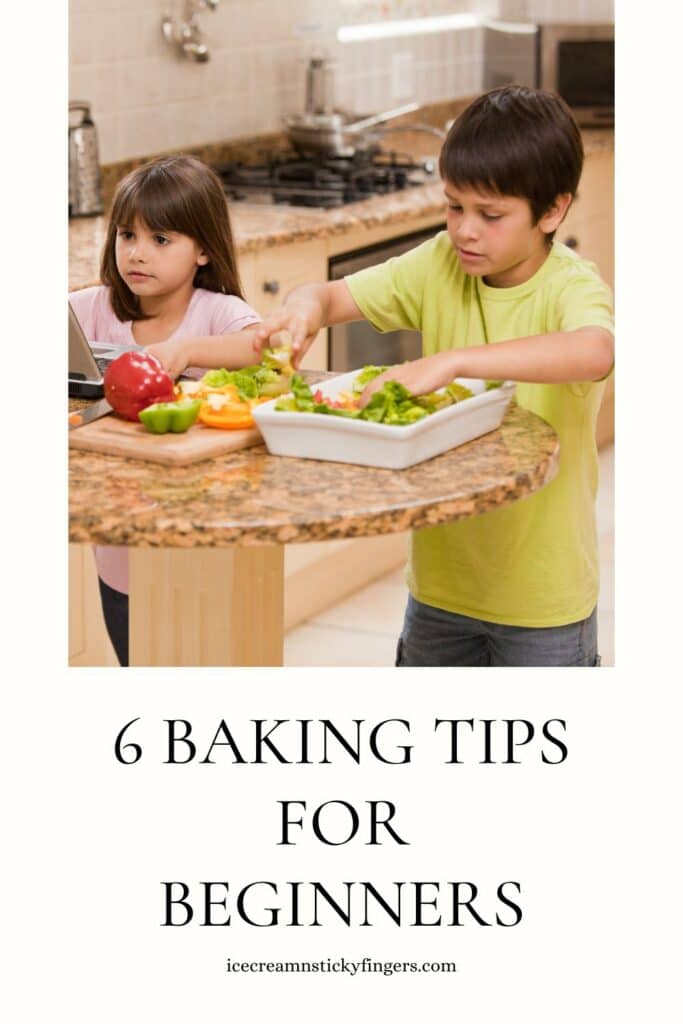What are some baking tips for beginners? Baking can be intimidating, especially if you are a novice baker. The fear of wasting ingredients can deter you from baking. The need for precise measurements and strict recipe adherence for perfect results can also be overwhelming. Terms like folding, creaming, proofing, and tempering in the baking jargon don’t help either, making it seem like more of a challenge.

Despite the challenges, many people love baking and are passionate about it. Probably because they understand most baking mistakes can be evaded by just avoiding substitutes and knowing the basics.
So, even if you are a new baker, remember that patience, practice, and willingness to learn from your mistakes can make you excel at it.
To put you on track to becoming a confident baker, here is a list of simple tips. By following these tips, you will be whipping up delectable recipes quickly.
Start with Simple Recipes
Gaining confidence in your baking skills is crucial at the start of your baking journey. It can be achieved by successfully putting a few baking recipes on the table. It is easier to achieve perfect results by starting with simple recipes before moving on to more intricate ones.
Making muffins, cakes, and cookies in your initial days of baking goods is a good idea. Try variations of a few chosen recipes; for instance, try simple pound cake, basic vanilla cupcakes, eggless chocolate cake, and easy banana cake. Similarly, try making easy sugar cookies, simple chocolate chip cookies, and lemon shortbread cookies. Also, experiment only with the recipes you are familiar with and enjoy eating to know how the final product should taste and look.
Gradually, you can try a more intricate recipe, like chocolate chip scones. When you find what you believe is potentially the best chocolate chip scone recipe out there based on reviews and recommendations, follow the baking instructions of that chef closely.
A note to all beginner baking enthusiasts: Making simple baking recipes is just an exercise to learn about measuring ingredients, mixing, and baking times. You can move on to more complex recipes as you polish your skills and gain confidence.
Use Room Temperature Ingredients
Most baking recipes require using eggs, butter, and dairy at room temperature. Using ingredients at room temperature can significantly impact the outcomes of your recipe.
Here are some reasons that necessitate achieving room temperature for baking ingredients:
- Baking requires perfectly blending the ingredients. Ingredients at room temperature blend easily and smoothly, preventing any lumps in the batter or dough, whereas using cold eggs or butter can affect the texture of your baked goods.
- In recipes such as cakes where eggs are primary leavening agents, whipping them at room temperature allows them to incorporate air more effectively. As a result, they become smoother and fluffier.
- Using room temperature ingredients ensures a uniform temperature of your batter or dough after mixing all the ingredients, giving you even baking and consistent results.
- Butter creams better with sugar at room temperature, creating an airy and smooth texture and making your cake and cookies tender.
The best practice for bringing the ingredients, such as eggs and milk, to room temperature is leaving them out of the fridge overnight.
In the case of butter, cut it into smaller pieces and allow it to stay at room temperature for around one to two hours, depending on the ambient temperature.
Some recipes, such as certain pastries or pie crusts, might require the ingredients to be at a specific temperature. However, using ingredients at room temperature generally provides better baking results.
Measure Precisely
When it comes to baking, the accuracy of measuring the ingredients can deliver perfect results or ruin your baked goods.
The ideal way to ensure precise measurement is to use a digital scale to weigh the ingredients. But if you don’t have one, use the spoon and level method to measure the dry ingredients.
Fill a measuring cup with dry ingredients such as flour and sugar, then sweep off the excess contents from the top with a straight edge. Even if it seems nit-picky, stick to this method for perfect results.
You might be tempted to scoop the flour into the quantifying cup and pack it tightly. However, packing it this way can leave you with more than the required flour, making your baked goods drier. The only exception that allows packing in a measuring cup is brown sugar.
As for the liquid ingredients, measure them in clear measuring cups having pour spouts at the brim and gradation on the sides. This way, you can see when the ingredients touch a certain mark. By following these little tips, you can confidently proceed with the rest of the baking activities.

Invest in Good Quality Tools
While baking does not require fancy tools, and there is no need to splurge on every gadget available, you must still have the essential tools. Have high-quality measuring cups, mixing bowls, scales, and spatulas.
Buying tools specially made for baking is essential. Such tools are often made with high-quality materials, making them more durable and long-lasting. They can survive recurrent use and still maintain their performance over time.
In addition, high-quality measuring cups and scales ensure precise measurement of ingredients, offering you consistent and accurate results time and again.
Some versatile tools serve multiple purposes, offering more bang for your buck. For instance, by purchasing a stand mixture, you can use its bowels for mixing ingredients, kneading dough, and whipping cream.
Follow the Recipe
Following the recipe for baking something is unlike cooking other types of food. Here there is little to no room for improvisation. Therefore, when they say read the recipe, it means to follow it thoroughly to the letter to achieve the best results.
Read the recipe:
- To check if the ingredients need any preparation before mixing them
- Consider the type and measurement of the pan you need.
- See how and when various ingredients must be added.
- How long the batter or dough needs to sit.
Understanding the equipment, ingredients, and preparation will immensely contribute to making your recipe successful.
Don’t Use Substitutes
While it is generally okay to use substitute ingredients when making other types of food, this is not the case with baking. Take baking as a science—chemistry, to be precise. Don’t expect delectable and perfect results unless you add the right ingredients and in the right quantity. And as for experimentation, do it at your own risk.
But but….
The recipe police won’t come looking for you if you add little things that don’t change the recipe’s chemistry. For instance, you can confidently add nuts and chocolate chips or use lemon zest instead of orange zest.
Conclusion
People are not passionate about baking for nothing. It’s true that it is a science, but it also gives you ample room for creativity, such as topping your cakes and cookies. However, ensure your creativity does not touch baking basics, such as precise measurement and accurate temperature settings. As long as you follow the essential tips mentioned in this article, you are good to go!




I need to remember this. I am not the best baker. I love sweets, but actually having to make them is not my idea of fun. However, I need to save money so I need to start making more stuff at home.
Following the recipe is such great advice! It seems like it doesn’t need to be said, but how often do we try to make it up as we go, only to wish we had followed the recipe, lol!
These are wonderful tips for those just starting out. I personally love to cook. I like it when the kids get in the kitchen to help too.
During the start of the pandemic me and my daughter begun our baking journey and we were novice! Out first attempt was a simple sugar cookie and it was quite good, though we just eye-balled some ingredients.
My granddaughter is 10 and she is starting to bake with her dad. They have such a good time .I love seeing the pics.
Im personally new to baking so this post was for sure super helpful!
Such great tips here and I love to bake but find breads and such….. anything that involves using yeast a challenge. I can bake a cake, cupcakes, muffins, cookies and pies with the best of them and that is from years of practice since I was a kid. Love the post and thanks for sharing 😉
These are great tips for budding bakers! It’s also good to go with the lowest time recommended for cooking time and if the food isn’t done cooking leaving it in in 3-5 minute increments until it’s fully cooked to figure out a good bake time for your particular oven is a good approach too!
As a beginner, I often find myself overwhelmed with the technical terms and the precision required, but your post has made things much clearer and more approachable!
i have learned that we don’t deviate much from the recipe and steps for baking with experience and weird baking results 🙂
I will have to remember this. I don’t bake that much. thanks for sharing these tips with us.
I might be the kind of mom who bakes all the time if I have the tools that I need! Just glad to know that I don’t need to have the kinda fancy tools to start.
I always seeing baking ideos in my reels when browsing, and I think seeing this blog is a sign to start my baking journey. My daughter love cookies so I would like to start on that.